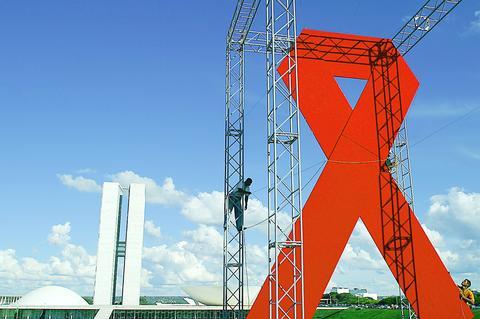The AIDS pandemic rampaging around the globe will not be stopped without radical social change to improve the lot of women and girls, who now look likely to die in greater numbers than men, UN agencies said on Tuesday.
Infections among women are soaring, from sub-Saharan Africa to Asia to Russia. What began as a series of epidemics among men -- in some regions gay and bisexual men, in others men who frequented sex workers or male drug users -- has spread to their female partners who are biologically more easily infected.

PHOTO: AP
In many countries, women's subordinate status, and their lack of education and economic power have made it impossible for them to negotiate sex with men or to ask for the use of condoms. Yesterday the UN agency set up to combat the pandemic, UNAIDS, called for all that to change in the interests of checking the spread of a disease which killed 3.1 million adults and children last year.
"We will not be able to stop this epidemic unless we put women at the heart of the response to AIDS," said UNAIDS' executive director, Peter Piot.
At the launch of the UNAIDS annual report on the pandemic yesterday, actress Emma Thompson, who is a founder member of the Global Coalition on Women and AIDS launched this year, put it in starker fashion.
"There are some countries where women are an endangered species -- they will disappear from the face of the earth," she said.
"I think this is the greatest catastrophe that the human race has ever faced," she said.
Across the globe, 39.4 million people, including 2.2 million children, are carrying the HIV virus and will die without treatment to contain it -- up from about 36.2 million two years ago. Only one in 10 in developing countries can get the drugs they need.
Last year, 4.9 million people were newly infected and 3.1 million died. In some parts, such as sub-Saharan Africa, the numbers living with HIV appear to have stabilized, but only because as many are now dying as are acquiring infection.
In the UK, HIV continues to spread. UNAIDS says it "has become the fastest-growing serious health condition." A report today from the UK's Health Protection Agency will confirm the trend. Last year there were 7,000 new diagnoses, taking the total numbers living with infection well above 50,000.
The numbers of women affected globally are rising faster than those of men, now making up nearly half of the total. In sub-Saharan Africa, where the pandemic is furthest advanced, the transition is complete -- 57 percent of those with HIV are women. In Zambia, Zimbabwe and South Africa, 77 percent of all young people infected virus are women.
Across nine countries in that region, the infection rate in the whole population is one in four.
In other parts of the world, there have been large hikes in the proportion of women affected. In east Asia, there has been a 56 percent increase in the number of HIV positive women in the past few years.

VAGUE: The criteria of the amnesty remain unclear, but it would cover political violence from 1999 to today, and those convicted of murder or drug trafficking would not qualify Venezuelan Acting President Delcy Rodriguez on Friday announced an amnesty bill that could lead to the release of hundreds of prisoners, including opposition leaders, journalists and human rights activists detained for political reasons. The measure had long been sought by the US-backed opposition. It is the latest concession Rodriguez has made since taking the reins of the country on Jan. 3 after the brazen seizure of then-Venezuelan president Nicolas Maduro. Rodriguez told a gathering of justices, magistrates, ministers, military brass and other government leaders that the ruling party-controlled Venezuelan National Assembly would take up the bill with urgency. Rodriguez also announced the shutdown

Civil society leaders and members of a left-wing coalition yesterday filed impeachment complaints against Philippine Vice President Sara Duterte, restarting a process sidelined by the Supreme Court last year. Both cases accuse Duterte of misusing public funds during her term as education secretary, while one revives allegations that she threatened to assassinate former ally Philippine President Ferdinand Marcos Jr. The filings come on the same day that a committee in the House of Representatives was to begin hearings into impeachment complaints against Marcos, accused of corruption tied to a spiraling scandal over bogus flood control projects. Under the constitution, an impeachment by the

Exiled Tibetans began a unique global election yesterday for a government representing a homeland many have never seen, as part of a democratic exercise voters say carries great weight. From red-robed Buddhist monks in the snowy Himalayas, to political exiles in megacities across South Asia, to refugees in Australia, Europe and North America, voting takes place in 27 countries — but not China. “Elections ... show that the struggle for Tibet’s freedom and independence continues from generation to generation,” said candidate Gyaltsen Chokye, 33, who is based in the Indian hill-town of Dharamsala, headquarters of the government-in-exile, the Central Tibetan Administration (CTA). It

China executed 11 people linked to Myanmar criminal gangs, including “key members” of telecom scam operations, state media reported yesterday, as Beijing toughens its response to the sprawling, transnational industry. Fraud compounds where scammers lure Internet users into fake romantic relationships and cryptocurrency investments have flourished across Southeast Asia, including in Myanmar. Initially largely targeting Chinese speakers, the criminal groups behind the compounds have expanded operations into multiple languages to steal from victims around the world. Those conducting the scams are sometimes willing con artists, and other times trafficked foreign nationals forced to work. In the past few years, Beijing has stepped up cooperation